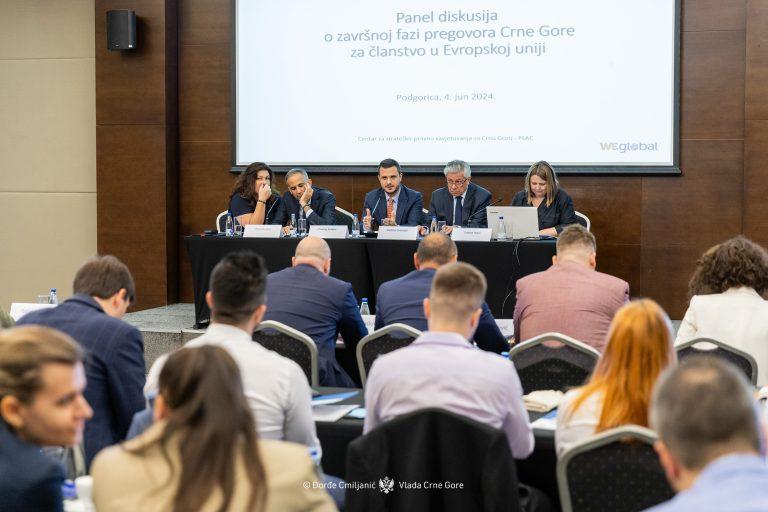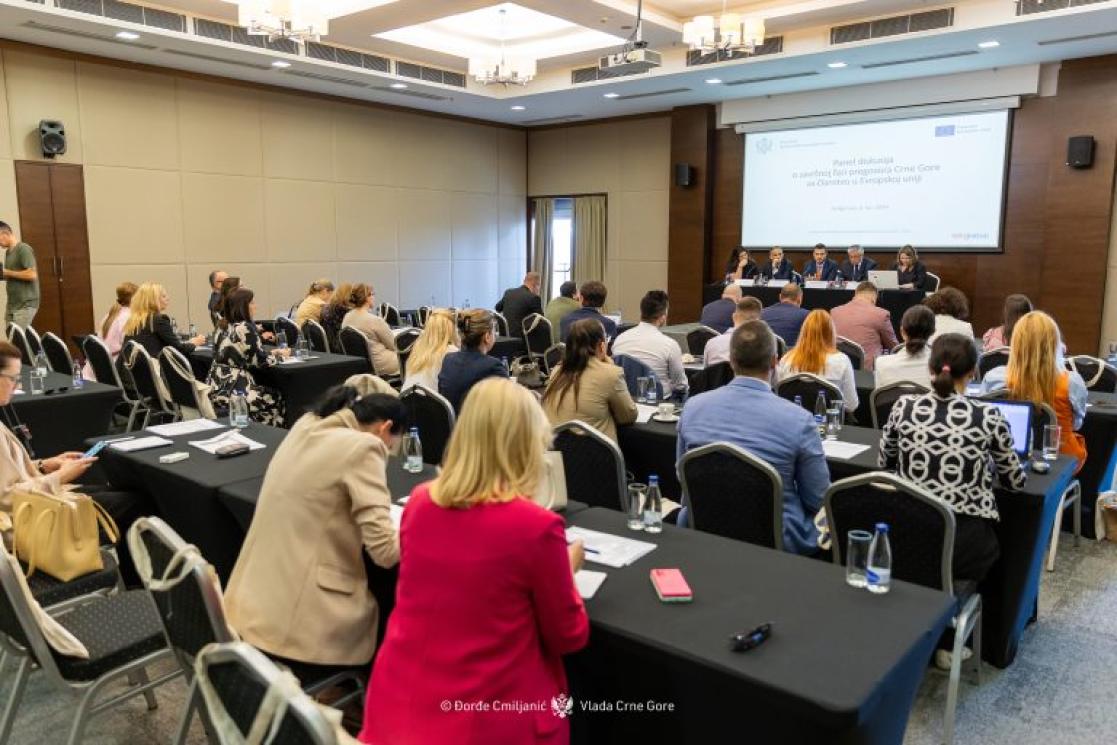Montenegro has done an impressive job, it is important to maintain a good momentum and accelerate the EU accession

Montenegro has done an impressive job and achieved exceptional results in Chapters 23 and 24 over the past few months. It is important to maintain a good momentum and accelerate the EU accession process in the upcoming period, as it will bring numerous benefits for society and citizens. This was the message conveyed during the panel discussion on the final phase of Montenegro's EU membership negotiations.
The panel, attended by members of the negotiating structure (negotiators, heads, and secretaries of negotiating working groups), was organised by the Ministry of European Affairs within the EU-funded project "Policy and Legal Advice Centre for Montenegro–PLAC."
The Chief Negotiator of Montenegro with the EU, Predrag Zenović, former Chief Negotiator of the Republic of Croatia with the EU, Vladimir Drobnjak, Deputy Head of the Delegation of the European Union to Montenegro, Riccardo Serri, and the Head of the PLAC project, Tatjana Tomić, spoke during the event.
The Chief Negotiator of Montenegro with the EU, Predrag Zenović, stated that Montenegro's negotiating process is being conducted on two tracks.
"The first track is the negotiating one, focused on Chapters 23 and 24 and obtaining the IBAR. In this area, we have had maximum acceleration, and intensive work has resulted in amended legal solutions, adopted regulations, and strategic plans. We have had six months that can make up for years of work in these Chapters," Zenović stated.

Copyright: Đorđe Cmiljanić
He mentioned that the second important segment relates to a new financial mechanism, namely, the Growth Plan for the Western Balkans and the creation of the Reform Agenda, which have their own dynamics and are intertwined with the reforms Montenegro is implementing.
"These are the two tracks that bring Montenegro closer to the EU," Zenović concluded.
Zenović highlighted the importance of using the experiences of the Republic of Croatia from the accession negotiations as a guide and possible way to accelerate the process.
Former Chief Negotiator of the Republic of Croatia with the EU, Vladimir Drobnjak, stated that Montenegro is far ahead of other candidate countries and that the fact that all negotiating Chapters are open represents a huge asset that should be utilised.
"Resolving the interim benchmarks gives you the opportunity to gain new momentum and move forward at full speed," Drobnjak stated.
He mentioned that accession negotiations, in the organisational, legal, and administrative parts, are the most difficult process a country can go through because there is no area that will be bypassed, and he stressed the importance of everyone being involved.
"The experience of the Republic of Croatia shows that the effort pays off and that the EU membership is worth it," Drobnjak stated.
Deputy Head of the Delegation of the European Union to Montenegro, Riccardo Serri, reminded of several key laws adopted by the government.
"All these laws are, in principle, aligned with the best EU standards. We expect their smooth adoption by the legislative authority by the end of this week," Serri stated.
He emphasised that a positive report on the fulfilment of interim benchmarks (IBAR) is not an end in itself but can be a crucial step forward in overcoming obstacles that have characterised the accession process in recent years.
"This would also lead to an acceleration of the accession process in the upcoming period, with the possibility of closing several chapters in line with the revised enlargement methodology," Serri explained.
Head of the PLAC project, Tatjana Tomić, stated that the project "Policy and Legal Advice Centre for Montenegro–PLAC" started in September 2023 and is set to last two years. She highlighted that the project's goals are to support Montenegro in aligning with the EU's acquis, as well as to support the translation of the acquis.
She mentioned that the focus is on supporting four negotiating Chapters: 1. Free movement of goods, 3. Right of establishment and freedom to provide services, 8. Competition policy, and 27. Environment and Climate Change.
"The project is aimed at providing support to Montenegro. The more requests we receive from you, the more we can help you," Tomić concluded.




